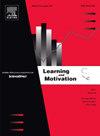Exploring enjoyment, motivation, self-efficacy, and engagement in AI-assisted English learning: A self-determination theory approach
IF 1.8
4区 心理学
Q3 PSYCHOLOGY, BIOLOGICAL
引用次数: 0
Abstract
As artificial intelligence becomes rapidly integrated into language education, the need to understand learners’ psychological responses has grown increasingly important. However, limited research has systematically examined how emotional and motivational factors interact in AI-assisted English learning. This study investigates the relationships among enjoyment, motivation, self-efficacy, and engagement in the context of AI-assisted English learning, guided by Self-Determination Theory (SDT). A total of 840 university students participated in the study. Data analysis was carried out using SPSS 26.0 and AMOS 26.0. Structural equation modeling revealed that both enjoyment and motivation significantly predicted self-efficacy and engagement, while self-efficacy also strongly predicted engagement. Mediation analysis further confirmed that self-efficacy significantly mediated the relationships between enjoyment and engagement, as well as between motivation and engagement. These findings highlight the critical role of emotional and motivational factors in enhancing learner confidence and involvement in technology-supported language education. The results provide empirical support for applying SDT in AI-enhanced learning environments and offer practical implications for designing emotionally supportive and psychologically empowering AI tools for language learners.
探索人工智能辅助英语学习的乐趣、动机、自我效能和参与:一种自决理论方法
随着人工智能迅速融入语言教育,了解学习者心理反应的需求变得越来越重要。然而,有限的研究系统地考察了情感和动机因素在人工智能辅助英语学习中的相互作用。本研究在自我决定理论(SDT)的指导下,探讨了人工智能辅助英语学习中享受、动机、自我效能和投入之间的关系。共有840名大学生参与了这项研究。采用SPSS 26.0和AMOS 26.0进行数据分析。结构方程模型显示,快乐和动机对自我效能感和投入有显著的预测作用,而自我效能感对投入也有显著的预测作用。中介分析进一步证实,自我效能显著中介了享受与投入、动机与投入之间的关系。这些发现强调了情感和动机因素在增强学习者信心和参与技术支持的语言教育中的关键作用。研究结果为在人工智能增强的学习环境中应用SDT提供了经验支持,并为语言学习者设计情感支持和心理授权的人工智能工具提供了实际意义。
本文章由计算机程序翻译,如有差异,请以英文原文为准。
求助全文
约1分钟内获得全文
求助全文
来源期刊

Learning and Motivation
Multiple-
CiteScore
2.90
自引率
0.00%
发文量
53
期刊介绍:
Learning and Motivation features original experimental research devoted to the analysis of basic phenomena and mechanisms of learning, memory, and motivation. These studies, involving either animal or human subjects, examine behavioral, biological, and evolutionary influences on the learning and motivation processes, and often report on an integrated series of experiments that advance knowledge in this field. Theoretical papers and shorter reports are also considered.
 求助内容:
求助内容: 应助结果提醒方式:
应助结果提醒方式:


